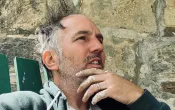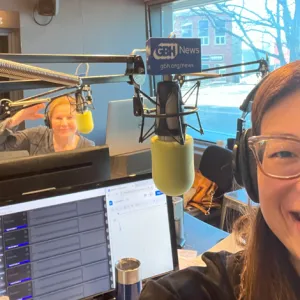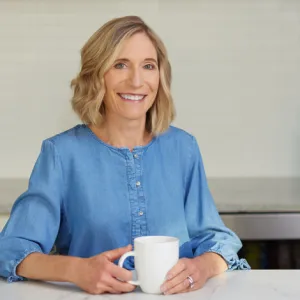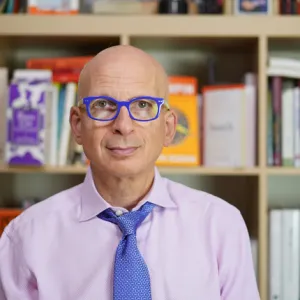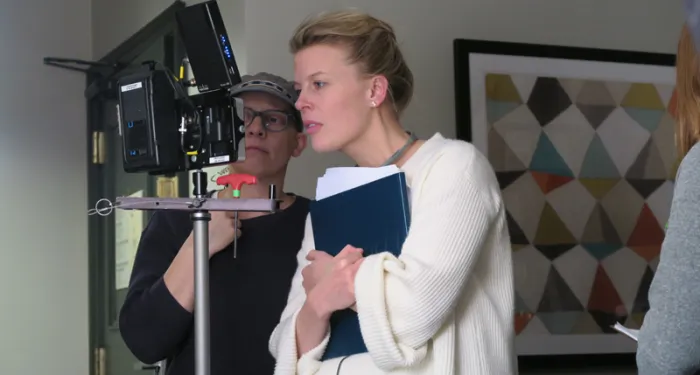
Caroline Slaughter
Gifts Anyone Can Give
Storytelling lets us see someone else’s point of view. We can better understand their experience. Is that an act of generosity?
Everyone has a story. This episode considers the question: Can telling a story be a gift you give?
Our guest is Caroline Slaughter, an award-winning filmmaker, podcaster, writer, producer, and voiceover artist who's made a career of telling narratives that resonate with audiences worldwide. Her work includes the Top 15-podcast Astray and short film LAMB.
I met Caroline after she reached out with ideas for the Crazy Good Turns podcast, and suggested this topic. During our interview, she explains why she feels there is generosity in storytelling.
"Storytelling unites humanity," Caroline tells us. "That's a pretty bold statement, but I really do believe that and I've seen it happen."
During the show, Caroline discusses the empathy and understanding that come from watching, reading, and listening to the stories of others.
You'll also hear Caroline turn the tables and interview me a little bit, and throw some questions at me. Look for that later in the interview.
FRANK BLAKE: Welcome Caroline. It's great to have you on.
CAROLINE SLAUGHTER: Thanks, Frank. It's great to be here. I mean, I do listen to the podcast and you've interviewed so many influential, extraordinary, generous people. So it's an honor to be interviewed by you.
FRANK BLAKE: Terrific. Well, Caroline, again, for the audience's benefit, they should know you directed the award-winning short film Lamb, L-A-M-B.
You're involved with so many amazing podcasts including podcast with Andy Samberg, the SNL, Saturday Night Live Personality, and you've got top 15 podcast, but I also couldn't help noticing a quote in your Instagram Bio that talked about "turning heartbreak into action," and I just thought a good place to would be, what does that mean to you?
CAROLINE SLAUGHTER: Well, Lamb was a personal reaction to the #MeToo Movement that I had, and that reaction and that feeling that I had felt like heartbreak, and I was able to take that and create a film that ended up ultimately being a unifier for my all-female crew and for the people that saw it at the film festivals. And so I think what I mean by "turn heartbreak into action" is, you can take something that might feel like pain and turn it into something that can unite people. And that's what I did with Lamb specifically.
FRANK BLAKE: Explain what you do as a storyteller? Whether it's through film, podcast, whatever.
CAROLINE SLAUGHTER: Well, I'm a compulsively curious person. So like you, I'm so interested in why people do what they do, why they are who they are, and I think that has driven me towards storytelling. And a lot of my stories are character-driven, which means that I start with humans first, and then I build the story from that. So I think that's sort of what led me to story, is that curiosity about others.
FRANK BLAKE: Well, now tell me a little bit about Astray, and the podcast Astray because that seems like a great example of that.
CAROLINE SLAUGHTER: Well, Astray was interesting. I was sort of put into the role of journalist in that one and I was investigating the disappearance of three Westerners who went to India on these spiritual quests seeking enlightenment. And so in Astray specifically, we were looking at the cost of enlightenment and how far people go for that sort of spiritual curiosity. I think I started with that story because I was so intrigued by why people… by what spirituality is, and why people are so drawn to it, and why it's a $4.5 billion industry. And then we chose India because of these sort of disappearances. But I learned a lot through that because I was dealing with a lot of grief, with grieving parents specifically, and I learned that these human stories are really… you have to be very careful telling other people's stories and relaying them to an audience.
FRANK BLAKE: Because the folks left behind will misunderstand? Why do you have to be so careful?
CAROLINE SLAUGHTER: Because people have a specific idea of how someone they loved lived their lives. People have ideas of the people that they love the most. And I think when you shed light on things that those loved ones might not want to see, or when you put things out in the world that might be hard for them to hear, that's hard because it sort of taints this idea of the person that they loved.
FRANK BLAKE: Yeah. And if you were to say, what were some of the learnings from that, or from other stories that you've told, what have you learned about the narrative arc or how you can use stories to help people move through difficult times, get better, however you want to approach it?
CAROLINE SLAUGHTER: Well, I think story is, you know, it's such an interesting thing. I think when you create stories like me, there's an awareness that comes out of them because I'm sort of relating to this story and putting myself to the story. For listeners of a podcast or watchers or viewers of a film, they get an awareness if there's something that sort of resonates with them in that story. But also I think there's an empathy that comes from storytelling from watching other stories, even if you don't understand them.
I didn't understand much about India when I was doing this story and I was working with my co-producer over there and they were going through COVID at the time. And so we really spoke about that, we were going through COVID as well, but they were going through that really difficult time that they had where there was not a lot of medicine, or there was no vaccine for them. And so being able to sort of empathize with what they were going through while we were telling this story was very profound and it was disturbing in some ways, because I couldn't get over there and help, and I felt like I was telling this story about a place that was sort of in disarray and there was no way for me to over here.
FRANK BLAKE: Well, when you reflect on it, are there stories that you think that you've started to tell and in the telling of it, it's actually helped changed you for the better?
CAROLINE SLAUGHTER: I think all stories help change you for the better. I think a lot of times we come into storytelling thinking that a story will go one way and we try to control it, but if you allow a story to be what it's supposed to be, a lot of times it does end up changing you because it's sort of your own evolution as the storyteller. So I think all stories changed me.
FRANK BLAKE: I'm curious, just as you're approaching a story and also very effective, and as I said at the start in many different kinds of media, do you find yourself tempted to put a harsher edge on stories because that's what generates audience to make them a little more sensational, emphasize certain elements of it, or do you find a way to resist that temptation?
CAROLINE SLAUGHTER: It's hard because a lot of the marketplace right now, especially in podcasts, as we all know is a lot of true-crime, and so I was, specifically with Astray, put into that niche. And for me it was really difficult to try to sensationalize these stories, even though there was a lot of hype around them, and they were already somewhat sensationalized by the media, it was hard for me to do that. So I tried to really bring experts in to understand the various facets that we were uncovering, and to even discuss true crime in general, why people are drawn to true crime, and why women specifically are drawn to true crime. So to answer-
FRANK BLAKE: Why is that? I'm curious, why are we drawn to true crime? Why would we rather listen to a true crime story than about a story about somebody who's done something great for others? Why do you think?
CAROLINE SLAUGHTER: I think that women specifically are trying to prepare for something that might happen to them, like I think there's a little bit of that preparedness of like, "I will know and control everything around me, so if this happens to me, I will know how to take care of it or how to save myself." I think the sensational nature of true crime is an escapism that a lot of people were sort of looking for before the pandemic. I think when the pandemic hit shows like Ted Lasso really blowed up because people want joy. I think people want more of that happiness. And Tom Slick, the piece I'm doing with Andy Samberg is about this tremendously influential man that no one's heard of, incredible guy.
FRANK BLAKE: This is a true story?
CAROLINE SLAUGHTER: It's a true story.
He established five major research institutes, one of them developed the COVID vaccination. He hunted the Yeti for five years and this is really fascinating. And by hunting, I don't mean he actually was hunting the Yeti, he was very into mysticism and he wanted to see if the Yeti was alive. And so he ended up finding a Yeti digit like a finger in a monastery in like somewhere in the Himalayas. He ends up getting it to Kathmandu to Jimmy Stewart, and Jimmy Stewart ends up getting it over to London. His wife hides it in her underwear, in her suitcase, so no one will look for it.
They get it to London, it goes to a scientist, he examines it. It's not a bear, it's not a human, no one knows what it is. And then the scientist dies, no joke. And the Yeti digit disappears, and so when no one knows where it is. It's very fascinating and that's sort of what we're doing in the Tom Slick story. But this man, he's amazing, he allegedly got Dalai Lama out of Nepal to India, he wrote two books on world peace, and he created one of the first oral contraceptions because he was all about population control, so fascinating. So I think-
FRANK BLAKE: What an amazing… So you're exploring this person's life.
CAROLINE SLAUGHTER: That's right. And to answer your question, I'm getting out of true crime because I want to tell extraordinary stories, you and I bonded over generosity and goodness in the world. And I think we need more of those stories. So yes. To answer your question, I'm getting out of the true crime realm and going into goodness.
FRANK BLAKE: So, we did talk a lot about generosity and you've said to me and to others, that there's generosity in storytelling. What do you mean by that?
CAROLINE SLAUGHTER: I think there's generosity in storytelling because… I think storytelling brings awareness not only about the world around us, but an inner awareness. And I think there are times when you leave a film or you finish reading a book and there's an element of that story that brings some sort of awareness to your own life. But I also think, like I said earlier, you can read a book or watch a film, and you can experience a life that you wouldn't normally experience, or someone's point of view. And you can have empathy for that point of view, and you can connect to that point of view. And I think that's the generosity of storytelling is that connection and that awareness of other people, and that's the unifier of storytelling. I think storytelling unites humanity, which is a pretty profound bold statement, but I really do believe that and I've seen it happen.
FRANK BLAKE: My answer to that question is not at all dissimilar. I mean, stories are very much about sharing, and they're sharing perspectives, and the best storytellers are the ones who immerse you in another life. And through that process, I think you get a better understanding of others and a better sympathy, empathy. And it all starts with appreciation and recognizing that everyone is… someone who deserves our attention and gratitude in a way, and ultimately our generosity. So I think the best stories really connect in that way. And whether they have the endpoint as a generous story or not, they connect in that way.
CAROLINE SLAUGHTER: Do you feel like when you were at Home Depot, that stories helped to unite the people that worked with you?
FRANK BLAKE: I do. I'm not a brain scientist, so I don't know how this works, but I think we remember stories long after we remember stock phrases or "Here's what we want you to do." Or mission statements and all the rest, we remember stories.if you want to get someone to appreciate the experiences someone else has been through, stories are the best way to do that. It's not a polemical argument, it's an argument through example and experience. And stories can provide that. Then I know certainly in my own life, the things that I most remember are stories. Long since forgotten many spreadsheets, but I remember the stories of the people.
CAROLINE SLAUGHTER: Do you feel like those letters that you would write people on Sundays that I've heard about in the podcast, those generosity letters, would you consider that a story?
FRANK BLAKE: Thank you notes that are powerful are thank you notes that are themselves specific and a bit of a story. So if I give a great example because someone just thanked my wife for some present she sent them. If they had sent a note that said, "Thank you very much. Your present was awesome, you're wonderful, love whomever", you know that would've been a nice note, but instead the note said, "Thank you very much. You gave us X. We so needed X because of Y, and because we had it, we were able to do Z" and there's a full story, you get a sense of real appreciation.
And so when I would write my notes to associates, I was always, or I tried to be careful to say something specific. Say something specific about what they've done, say something specific about them, their new job, whatever it was. What connects with people and it gives us the examples that we want to follow, and it broadens the understanding. It broadens all of our understanding, and one of my favorite quotes from Abraham Lincoln is… he is quoted as having said, "I don't like that man. I need to get to know him better." And that need to get to know someone better is what happens through stories. And that's how we overcome, "I don't like that person." And just pause and say, "I need to get to know that person better." And that comes from connection of story.
CAROLINE SLAUGHTER: I agree and stories that I think dig into the good too of people. We need more of that now, and especially over the holidays, since it's a holiday podcast, generosity, and goodness, and joy are just what we sort of have to be living with right now or what I think we should be.
FRANK BLAKE: All right. So I'm going to ask you two more practical questions or, how our audience can apply your knowledge to their lives. First question, storytelling. How do you think about what can people do, what can a normal person do, who doesn't have your gifts at storytelling to hone that skill in their lives? Then the second question, that's a more unusual question, but I am so fascinated by the fact that you're a voiceover artist, and I'm so curious as to how people use their voice as an instrument, and what you notice that people are effective at, or how they could become more effective using their voices.
CAROLINE SLAUGHTER: Well, I think the first one I'll tackle by saying that everyone's a storyteller, even though we don't believe we are because we don't all tell universal stories, but if you come home and you tell your partner about your day, there's usually a beginning, a middle and end. So you are telling a story. That being said, I think in order to tell universal stories, you have to understand the art of storytelling, and I also think you have to be a good observer. So two tools, one is to start journaling. I think journaling in the morning is really helpful. It gets out a lot of insights that you've had from your life and just sort of where you are right now. But also I think if you can start writing about your days, then you'll start to notice that you're writing scenes, and that you are picking up on different characters in your life, and people that… like your boss, who might chew his gum in a really obnoxious way.
Those things start to become prevalent and stand out to you, and those observations are what make you a good storyteller. I also would give another tool of just observation, at the grocery store or at airports. Oh my gosh, airports are the best. I just put my phone away and I just watch people, and I sort of make up stories in my head about who they are, and what this relationship is, and I think letting your brain sort of go wild in that way, it adds to your imagination, it gives you this freedom that that freedom of imagination is what you need to bring to the blank page so you can create. So I think those are two good tools, journaling and observation.
FRANK BLAKE: If I could ask you how much time do you spend journaling? So if you start the day journaling, I mean, I can't tell you the number of new year's resolutions that I start by saying, "I'm going to write a journal." And then by February I look back and maybe I did it twice. So how much time in the day do you spend doing that?
CAROLINE SLAUGHTER: Well, I think if someone wants to start writing, it should probably be about, I don't know, do three pages, write three pages and then you'll continue to grow from there. But I can't give you an exact time because I don't know.
FRANK BLAKE: It's not a discipline that says, "I got to do this for a half hour an hour." No.
CAROLINE SLAUGHTER: No. Well, why do you want to journal? What's your reason?
FRANK BLAKE: Because I hear people like to say that it's a great idea to do so I go, "All right, this is something I got to try." And then for whatever reason, the day overcomes me and I don't do it.
CAROLINE SLAUGHTER: Well, I find it to be an easier form of meditation too. I mean, I can't just sit down and be quiet. So this, it helps me in that way. To answer your second question about voiceover. So, in what context do you mean?
FRANK BLAKE: How does one even think about becoming a voiceover artist?
CAROLINE SLAUGHTER: Well, I think the first thing is to approach scripts and copy, which a lot of them were just, "You're selling things." Like I was the voice of Subway, and the Holiday Inn, and you're selling a night at the Holiday Inn, but if you think of it like a story, who are you speaking to? You're speaking to that family that is so excited to be going to Disney World and they're staying at the Holiday Inn, and the kids have just been up for the whole week, so excited about this, and you're speaking to that family, that's who you're voicing this for. So I think having a directive of who you're speaking to is key, then understanding the script, and being able to understand sort of the intentionality behind what they're saying.
FRANK BLAKE: Right. I mean, like people say about acting, it's getting behind the text and then understanding who you're trying to reach by doing this.
CAROLINE SLAUGHTER: That's right. That's right.
FRANK BLAKE: So if you look at, outside of Crazy Good Turns, which of course tells amazing stories that are positive for people, what are some other stories that have connected to you in a positive way?
CAROLINE SLAUGHTER: Well, this time of year, I love all the Christmas films. I know that sounds so silly and such an easy answer, but those bring me so much joy. And also I think recently, as I mentioned earlier, Ted Lasso, but-
FRANK BLAKE: Which is such a positively spirited show.
CAROLINE SLAUGHTER: Oh my gosh, it's all about generosity in its own way too. I think we're sort of coming into a space where more of these, because of Ted Lasso's success, I think more of these shows are being created.
FRANK BLAKE: That's interesting.
CAROLINE SLAUGHTER: Yeah. I've noticed that more, people are having more conversations about it. And even Tom Slick, which we could have sort of gone the Yeti dark dramatic route is not that.
FRANK BLAKE: At lost digit. You could have gone dark lost digit.
CAROLINE SLAUGHTER: Exactly. It's not that it's really celebrating this man's life and who he was, and that celebration, and also bringing integrity to his story. We're coming into more of an era of good stories, goodness stories, I guess you could say.
FRANK BLAKE: That's encouraging. That's excellent. So, that leads to my general question to you. So who has done a crazy good turn for Caroline Slaughter in your past?
CAROLINE SLAUGHTER: Well, I think Glen Jackson who introduced us has done a really great crazy good turn for me. I've had a handful of people like this in my life who are just generous people that see something in you and believe in you, and sort of support you in the next step. And I think I was in this place of sort of being in the true crime world of podcast and looking for the next step. And he was just such an influential person in that process. And yeah, I feel like I'm in a new place just mentally. So I'm really grateful to Glen.
FRANK BLAKE: He is a wonderful person and he is incredibly generous as you say. And is there someone you think goes, "Boy, but for Caroline Slaughter, she helped me so much. She did this for me." For whom you've done a crazy good turn.
CAROLINE SLAUGHTER: I really try to support female storytellers and filmmakers. It's a big part of my life mission. And so I try to give them guidance, I try to connect them to people, and I hire as many as I can so that I hope a handful of people have said the same thing about me.
FRANK BLAKE: All right. So now you've got a lot of people out there who's saying, "Boy, I'd love Caroline's help." How would people follow you, learn what you're doing, reach out to you. What's the best way to get in touch with you?
CAROLINE SLAUGHTER: My website is carolineslaughter.com, and that sort of updates people in what I'm doing. I'm not great at social media, but I'm @cslaughters on Instagram. Please feel free to reach out to me, I am going to be in a little bit of a crazy time with these upcoming podcasts, which thankfully I'm doing one for Headspace and it's going to be a feel-good one. So I'm excited about that, but I will try to answer as many questions as I can and share insight on storytelling. And this has encouraged me to create a blog post about storytelling. So I'll have that up by this weekend.
FRANK BLAKE: That's great. I want to end with I think your comment about the impact of Ted Lasso, and where things are going more generally towards stories about goodness, do you think that's just a momentary trend, or this might sustain itself, or just the way this system works? There's always a tendency to revert back to what's the sensational.
CAROLINE SLAUGHTER: I don't know, because I don't know what the trends are going to be. I think we're in such a weird time in general and things are shifting so radically so quickly, but I know for myself that I have an integrity as a storyteller, that I want to continue putting things out in the world that actually do add to the generosity and goodness, and that's all I can say is just sort of my own trajectory.
FRANK BLAKE: So I'm going to final question, as you said, we're in the holiday season for this episode, and it's always struck me that part of the storytelling around the holiday season is about awe, and people being awe, struck by whatever it is, by something. So there's something that's just left you in awe, and what would that thing be?
CAROLINE SLAUGHTER: I have two nephews and a niece, and the way they look at the world with this childlike wonder is just so contagious. And I think being able to look at things through their eyes when I'm with them, that brings me a sense of awe that I don't find in my everyday life all the time. I think I take things for granted, but when I'm with them, every little thing, even a donut is just so exciting. And I recently watched ET, which is my favorite film with my niece, and I love ET, it's why I wanted to be a filmmaker. The way that I felt watching that as a kid, it just made me want to do it. But my niece was watching it and to see her so engrossed in it, and just having that reaction that I had when I was younger, that brought me a sense of awe.
FRANK BLAKE: Yeah. Seeing things through a child's eye is maybe one of the best ways of experience being awe-struck.
CAROLINE SLAUGHTER: And for some reason, Christmas is that. I don't know if it's the films or what, but it brings you back to be… it's nostalgia. It brings you back to being a child again. Do you feel like that?
FRANK BLAKE: Yeah, absolutely. Without a doubt. Without a doubt. So Caroline, this has been terrific. Thank you so much, and again, thank you for all the great advice and counsel you've given Crazy Good Turns. You mentioned one project that you're working on, Tom Slick, are there others that you want to give a mention to before this podcast ends?
CAROLINE SLAUGHTER: Sure. I'm doing a podcast with Headspace called Hung Up and it's about relationships. It's going to be really interesting and pretty fun. And that's coming out, I think in April, and then Tom Slick should be coming out around that same time as well. So April, 2022.
FRANK BLAKE: All right. Excellent. Thank you so much, Caroline.
CAROLINE SLAUGHTER: Thank you.
I love your podcast. It is inspirational and a call to action. I often listen to a story and wonder how I could get involved in that cause. The two stories in the November episode brought me to tears.
There are so many crazy good turns that go unknown to a broad population, and I believe that adds to our society's negativity. It seems now, more than ever in my lifetime, there are groups creating division in our society.
People need to come together, and I think many want to, many are hesitant, or feel they don't have the time, to take the first step. If more people were exposed to how common kind acts really are they may be moved to perform a kind act as well, or at least be more aware and feel gratitude.
I think a good addition to the podcast would be to read a few examples of gratitude from people who were on the receiving end of someone performing a kind deed expecting nothing in return.
My team and I think James's idea is brilliant. So in this episode, we start out with exactly what James suggested: Stories of people who, whether by their acts or their example, give generously.
And to start it off, we share two stories: One from James himself, and one from me, about a Home Depot associate I met early on in my time there - who inspires me to this day.
